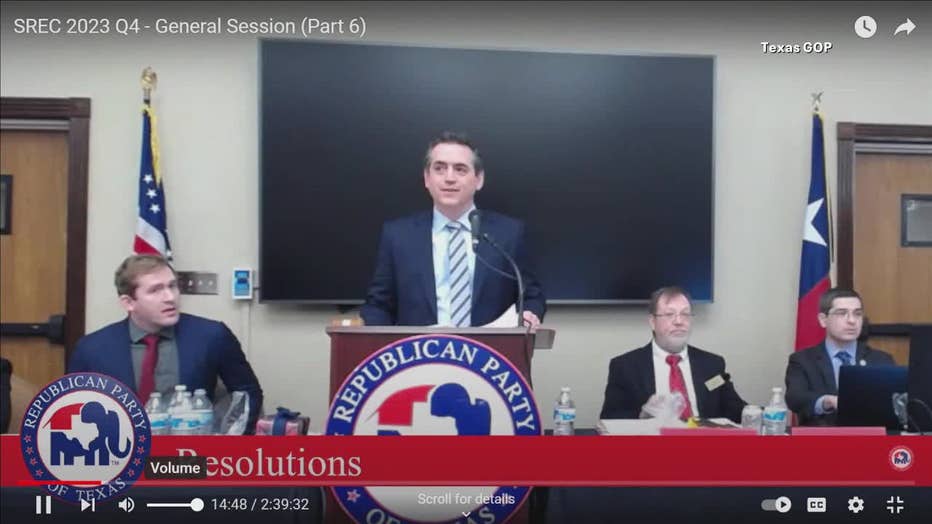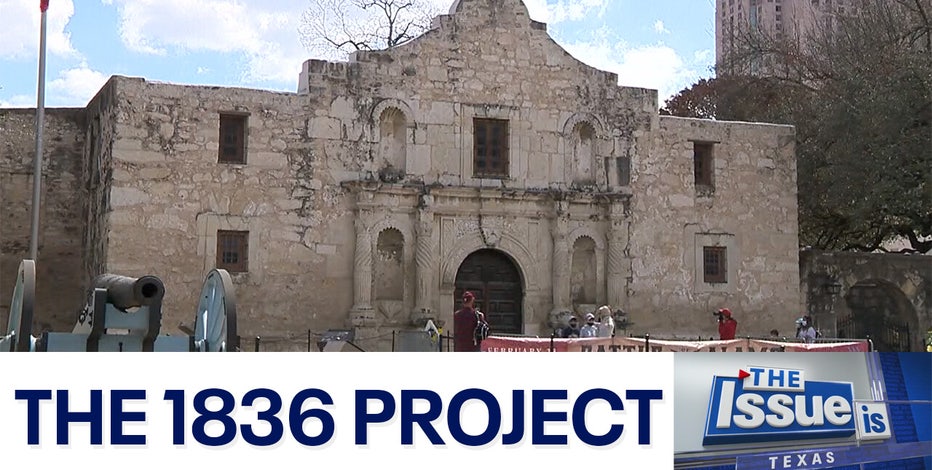Texas GOP executive committee rejects proposed ban on associating with Nazi sympathizers and Holocaust deniers
"Texas GOP executive committee rejects proposed ban on associating with Nazi sympathizers and Holocaust deniers" was first published by The Texas Tribune, a nonprofit, nonpartisan media organization that informs Texans — and engages with them — about public policy, politics, government and statewide issues.
Sign up for The Brief, The Texas Tribune’s daily newsletter that keeps readers up to speed on the most essential Texas news.
---
Two months after a prominent conservative activist and fundraiser was caught hosting white supremacist Nick Fuentes, leaders of the Republican Party of Texas have voted against barring the party from associating with known Nazi sympathizers and Holocaust deniers.
In a 32-29 vote on Saturday, members of the Texas GOP’s executive committee stripped a pro-Israel resolution of a clause that would have included the ban. In a separate move that stunned some members, roughly half of the board also tried to prevent a record of their vote from being kept.
In rejecting the proposed ban, the executive committee's majority delivered a serious blow to a faction of members that has called for the party to confront its ties to groups that have recently employed or associated with outspoken white supremacists and extremists.
In October, The Texas Tribune published photos of Fuentes, an avowed admirer of Adolf Hitler who has called for a "holy war" against Jews, entering and leaving the offices of Pale Horse Strategies, a consulting firm for far-right candidates and movements.

Pale Horse Strategies is owned by Jonathan Stickland, a former state representative and at the time the leader of a political action committee, Defend Texas Liberty, that two West Texas oil billionaires have used to fund right-wing movements, candidates and politicians in the state — including Lt. Gov. Dan Patrick and Attorney General Ken Paxton.
Matt Rinaldi, chairman of the Texas GOP, was also seen entering the Pale Horse offices while Fuentes was inside for nearly 7 hours. He denied participating, however, saying he was visiting with someone else at the time and didn’t know Fuentes was there.
Defend Texas Liberty has not publicly commented on the scandal, save for a two-sentence statement condemning those who've tried to connect the PAC to Fuentes’ "incendiary" views. Nor has the group clarified Stickland's current role at Defend Texas Liberty, which quietly updated its website in October to reflect that he is no longer its president. Tim Dunn, one of the two West Texas oil billionaires who primarily fund Defend Texas Liberty, confirmed the meeting between Fuentes and Stickland and called it a "serious blunder," according to a statement from Patrick.
In response to the scandal — as well as subsequent reporting from the Tribune that detailed other links between Defend Texas Liberty and white supremacists — nearly half of the Texas GOP’s executive committee had called for the party to cut ties with Defend Texas Liberty and its auxiliary groups until Stickland was removed from any position of power, and a full explanation for the Fuentes meeting was given.
The proposed demands were significantly watered down ahead of the party’s quarterly meeting this weekend. Rather than calling for a break from Defend Texas Liberty, the faction proposed general language that would have barred associations with individuals or groups "known to espouse or tolerate antisemitism, pro-Nazi sympathies or Holocaust denial."
But even that general statement was too much for the majority of the executive committee. In at-times tense debate on Saturday, members argued that words like "tolerate" or "antisemitism" were too vague or subjective. The ban, some argued, was akin to "Marxist" and "leftist" tactics, and would create guilt by association that could be problematic for the party, its leaders and candidates.
"It could put you on a slippery slope," said committee member Dan Tully.
Rinaldi abstained from voting on the ban, but briefly argued that antisemitism is not a serious problem on the right before questioning what it would mean to "tolerate" those who espouse it. "I don't see any antisemitic, pro-Nazi or Holocaust denial movement on the right that has any significant traction whatsoever," he said.
Featured
The 1836 Project: A look into the controversial Texas history project
It's been two years since state lawmakers created a special committee called The 1836 Project, which controversially hopes to develop a new way to promote Texas history. FOX 7's Rudy Koski spoke with committee chairman Don Frazier.
Supporters of the ban disagreed. They noted that the language was already a compromise, didn’t specifically name any group or individual and would lend credence to resolutions in which the Texas GOP has generally condemned antisemitism and restated its support for Israel.
"To take it out sends a very disturbing message," said Rolando Garcia, a Houston-based committee member who drafted the language. "We’re not specifying any individual or association. This is simply a statement of principle."
Other committee members questioned how their colleagues could find words like "antisemitism" too vague, despite frequently lobbing it and other terms at their political opponents.
"I just don’t understand how people who routinely refer to others as leftists, liberals, communists, socialists and RINOs (‘Republicans in Name Only’) don’t have the discernment to define what a Nazi is," committee member Morgan Cisneros Graham told the Tribune after the vote.
House Speaker Dade Phelan similarly condemned the vote Saturday evening, calling it "despicable."
The Texas GOP executive committee "can’t even bring themselves to denounce neo-Nazis and Holocaust deniers or cut ties with their top donor who brought them to the dance," Phelan wrote on X, formerly known as Twitter. "There is a moral, anti-Semitic rot festering within the fringes of BOTH parties that must be stopped."
For two months, Phelan and his staff have routinely and publicly sparred with some in the party – namely Rinaldi, a longtime political foe – over how to address the Fuentes scandal and extremism more broadly. After the Tribune first reported on the Fuentes meeting, Phelan called on fellow Republicans to redirect money from Defend Texas Liberty to pro-Israel charities, a request that quickly drew the ire of Patrick and others who accused Phelan of politicizing antisemitism and demanded he resign.
After subsequent reporting by the Tribune on Defend Texas Liberty's ties to white supremacists and other extreme figures, Patrick said he was "appalled" and that antisemitism is "not welcome in our party." He then announced that the he had invested the $3 million he recently received from Defend Texas Liberty in Israeli bonds.
Patrick reiterated that stance late Saturday night, calling the executive committee's vote "totally unacceptable" and saying that he is "confident" the board will reconsider the ban at its February meeting.
"This language should have been adopted – because I know that is our position as a Party," Patrick wrote on X. "I, and the overwhelming majority of Republicans in Texas, do not tolerate antisemites, and those who deny the Holocaust, praise Hitler or the Nazi regime."
Saturday’s vote is the latest sign of major disunity among the Texas GOP, which for years has dealt with simmering tensions between its far-right and more moderate, but still deeply conservative, wings. Defend Texas Liberty and its billionaire backers have been key players in that fight, funding primary challenges to incumbent Republicans who they deem insufficiently conservative, and bankrolling a sprawling network of institutions, media websites and political groups that they’ve used to incrementally pull Texas further to the right.
The party’s internecine conflict has exploded into all-out war since the impeachment and acquittal of Paxton, a crucial Defend Texas Liberty ally whose political life has been subsidized by the PAC’s billionaire funders.
After Paxton’s acquittal, Defend Texas Liberty vowed scorched-earth campaigns against those who supported the attorney general’s removal, and promised massive spending ahead of next year’s primary elections. (Before the Saturday vote, executive committee members separately approved a censure of outgoing Rep. Andrew Murr, R-Junction, over his lead role in the investigation and impeachment of Paxton.)
News of the Fuentes meeting has only complicated Defend Texas Liberty's retribution plans, as infighting intensifies and some Republicans question whether the group and its billionaire funders should have so much sway over the state party.
Meanwhile, Defend Texas Liberty's allies and beneficiaries have tried to downplay the scandals and discredit the Tribune's reporting, claiming the Fuentes meeting was a one-off mistake or attacking critics as RINOs, in bed with Democrats to suppress true conservatives.
Ahead of Saturday’s vote, Defend Texas Liberty-backed Reps. Nate Schatzline, R-Fort Worth, and Tony Tinderholt, R-Arlington, briefly spoke to the executive committee.
The day prior, Sen. Bob Hall — an Edgewood Republican who has received $50,000 from Defend Texas Liberty — was also at the Austin hotel where executive committee members were meeting, and in a speech condemned attempts to cut ties with the group based on what he called "hearsay," "fuzzy photographs" and "narratives."
"If you want to pass a resolution, I would make it positive," Hall said to executive committee members on Friday. "We don’t need to do our enemy’s work for them."
Hall reiterated that stance in an interview with the Tribune, calling the Fuentes meeting a "mistake" but claiming that there was "no evidence" that Stickland or Defend Texas Liberty are antisemitic. "I've had meetings with transgenders, gays and lesbians," Hall said. "Does that make me a transgender, gay or a lesbian?"
Asked if he was comparing gay people to white supremacists or Hitler admirers like Fuentes, Hall responded: "I’m talking about people who are political hot potatoes."
---
This article originally appeared in The Texas Tribune at https://www.texastribune.org/2023/12/02/texas-gop-antisemitism-resolution/.
The Texas Tribune is a member-supported, nonpartisan newsroom informing and engaging Texans on state politics and policy. Learn more at texastribune.org.


